Today, I’m presenting a GuestBlog from Kathy Smith who found my Blog just before she left for Dubiecko, Poland . The night before she left for Poland, Kathy called me and we had an interesting conversation about my trip to Dubiecko several years ago . Here’s Kathy’s GuestBlog on her trip to Dubiecko along with some of my photographs when I was there a few years ago. – Steve
                                                                            Â
I have just returned from my trip to Poland. I’ll give you a brief summary of my visit to Dubiecko.
Let me back up and say that my uncle visited the area two or three times before he died. He was our family historian and he was curious about his mother – my grandmother. There was a suspicion she might have been Jewish, but it was not spoken about in the family. It was something like a “family secret.” Apparently, he collected some anecdotal information about my grandmother’s family along the way.
My grandmother’s maiden name was Pilch. I knew that there were Catholics and Jews with the surname “Pilch” at the turn of the century. I also knew Dubiecko was half Catholic and half Jewish at the turn of the century. It was a typical Polish Shtetl. During my uncle’s trips, he couldn’t find any official information about my grandmother’s parents who were peasant farmers. He kept a “dead” end, so to speak.
The Florian Gate in Kraków
Unfortunately, I didn’t speak to him about his family tree research. I wasn’t too interested at the time. His daughters gave me the names and addresses of possible ancestors or friends of family.
The Cloth Hall (Sukiennice) in Kraków
I flew to Kraków on May 20′th 2006. When I arrived in Kraków, I contacted Adam Jędryka. I hired him to drive us to Dubiecko and act as a translator. We only had one day to look around, so my expectations were not high.
Mural in the Church in Dubiecko
Before we hit the road from Krakow to Dubiecko, we phoned the church in Dubiecko to inform them of our arrival. However, we were unable to get through by phone. No answering machine. For the sake of adventure, we just took off to see what we could see.
View from the Cemetery to the Church in Dubiecko
When we arrived at the village we went directly to the church. No answer.
So, we head for the Roman Catholic cemetery. It was a busy place. There was someone tending to the graves. There were a few visitors. The graves had flowers, and candles and shrines. We found all the headstones of the Kolanos (my maternal grandfather’s ancestors) and Pilch (the name of my maternal grandmother). Curiously, we could not find the graves of my great grandmother, great grandfather or any of their 8 children who were born and died in the area.
The Catholic Cemetery in Dubiecko
The church opened at 4:30 PM and we glanced through some records but with so little time – we could not find anything, much as I expected. In order for me to continue the family history work started by my uncle, I would consider hiring Adam to help me.
Baptismal Font in the Church in Dubiecko
Out of curiosity, we went to find the Jewish cemetary but it was deserted. We thought we might find my ancestors there. What a shock! There was no evidence of graves or gravestones. It was just a big piece of overgrown weeds. The headstones had been removed by the Nazis. They were used to make a road. There was no evidence of the Synagogue in Dubiecko. The few Jews who did not leave the area before the holocaust were shipped off to concentration camps. There is absolutely no evidence that Dubiecko was once a thriving Jewish community.
Text copyright © 2006 by Kathy Smith
Photos copyright © 2006 by Stephen J. Danko


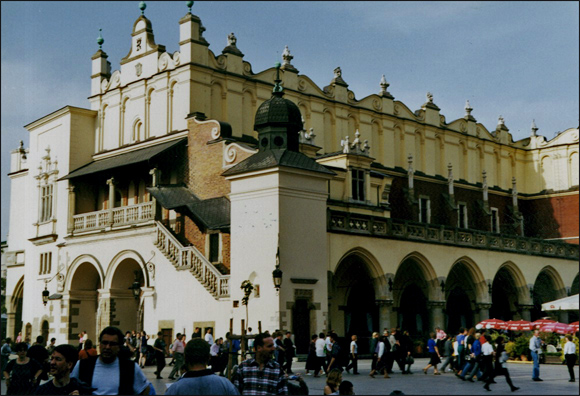
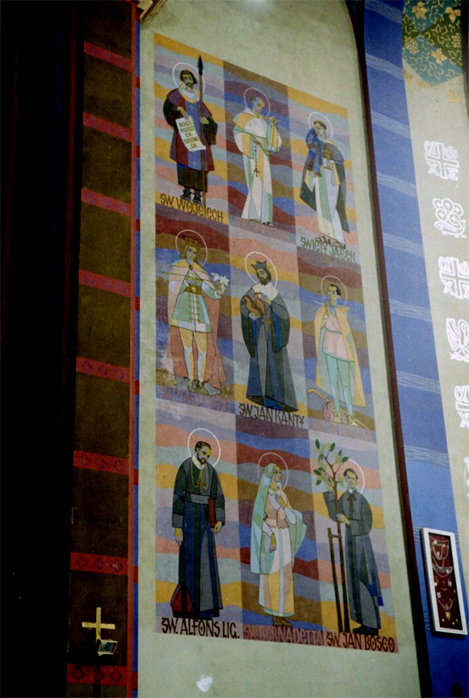
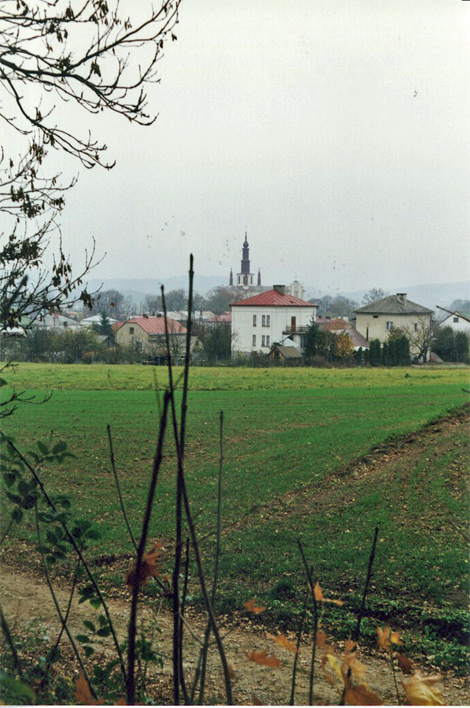
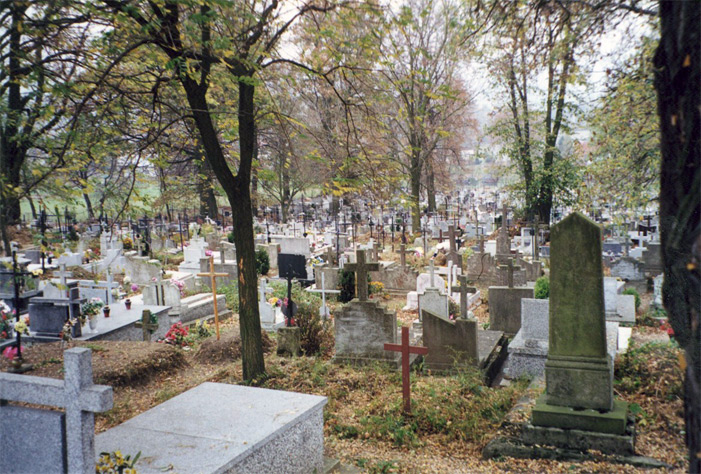
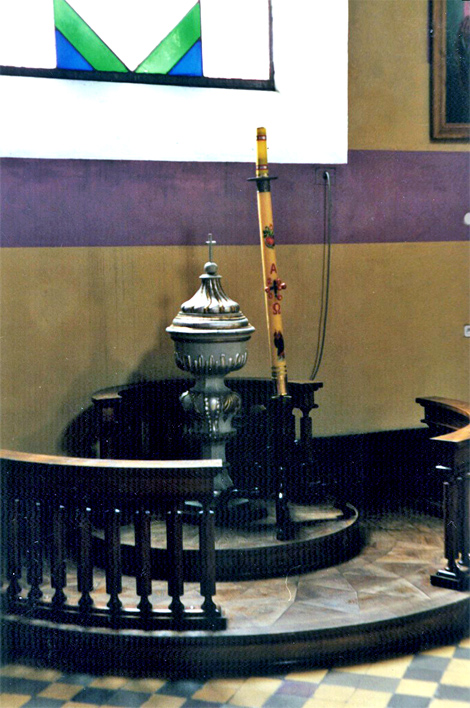
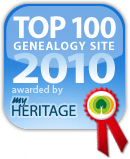

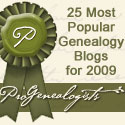
Dear Steve:
As you can gather from my last name, I am Jewish. My father was born in Dubiecko. Last June 2007 two of my cousins and I visited the shtetl. I also visited the Jewish cemetery only to see a recent wall built by descendents of Dubiecko’s and a field of weeds-no tombstones. A number of Jews were taken to the cemetery and shot. My father had one brother in Dubiecko when the war broke out. To this day we do not know what happen to him. He was not sent to a concentration camp. I don’t think that many people from the shtetl were sent to conentration camps. We were fortunate to have someone make contacts for us in the shtetl and visited with two families. We had a most interesting experience while we were there. Unfortunately it was only for a half day.
I do not know where you live but I live in New Jersey. My next door neighbors last name is Pilch. Until they moved in several years ago, I had never heard of that name. They are a young couple 30-40 years old. The woman is Chinese but converted to Judism.
Hi Bernice,
Thanks for writing. It’s nice to hear from someone else with roots in Dubiecko.
It was great to hear about your visit. My mother’s parents were from Dubiecko. My grandparents called it Dubetsk. My grandmother’s family, the Schimmels, owned the town inn. My grandfather’s family, the Erdman’s, managed a cattle ranch. I have seen records somewhere on the internet of the names of everyone in Dubetsk who perished in the Holocaust but I can’t recall where. My granparents left Poland after World War I since the Russians invaded and the area was under siege until 1920. Most of the family went to live in Berlin before coming to America. I have my grandmother’s passport listing her as being from Dubiecko.
What an interesting link to find! I was searching for my grandfathers family in Dubiecko. My grandfather was Josef Janowski. He made his way to Lolland, Denmark where I find him registrated in 1912. He was born in 1892 in Dubiecko and his mother was called Anna Pilch and his father Stephanus Janowski. Anna Pilch`s parents were (do not guarantee the spelling) Mariso Durep and Walbert Pilch. Do you recognize any of these? from Bente Helen Hansen, Denmark – helenogjon@mail.dk